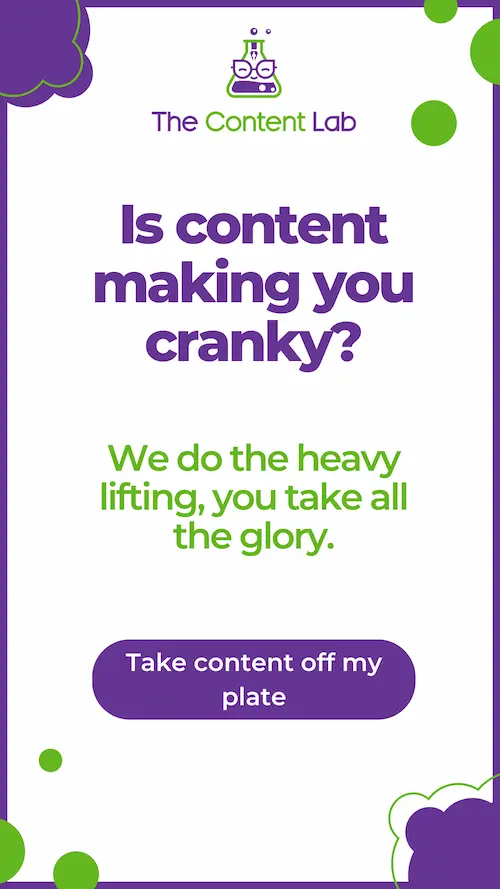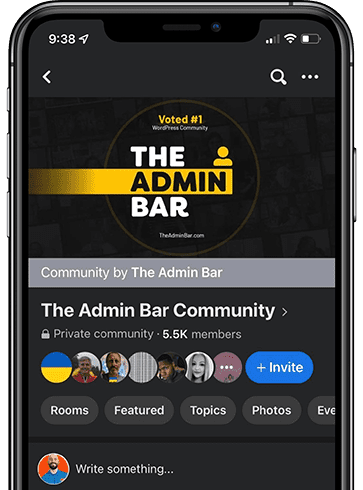Just like web developers and digital agencies, copywriters often run into two different types of clients: the good clients and the bad clients.
Now that’s not to say ‘bad’ clients are ‘bad’ people or a ‘bad’ to work with, they’re just not a good fit for that particular copywriter.
A bad fit client/copywriter relationship sucks for everyone involved: copy tends to be delivered late, clients are unhappy with the results, and resentment can build up from both parties.
Good client/copywriter relationships are like happy partnerships: work’s delivered on time, to spec, and everyone feels listened to and valued.
So, how can you avoid a bad fit relationship and get the best work out of your copywriter?
After ten years of working as a white label content strategist, managing other copywriters, and helping digital agencies with their content needs, I’ve picked up on a few common issues that can lead to a working relationship going south.
Now you’re probably reading this because you’re thinking of hiring a copywriter, and you want to be a good client and do whatever you can to make the process go smoothly. Or, you might have heard horror stories about working with copywriters and want to learn how to avoid becoming another example of hiring gone wrong.
Before we get into the nitty gritty, I do want to say this: there are definitely two parties to any working relationship – and you’re only in control of your own behaviours and approach to your projects. I’ve created this guide to help you be the best possible client for a copywriter, so you can get the best possible work out of your content partner. If things still aren’t working out, there may be some issues on their end they need to work on. Number one rule? Communication. But we can cover that another time.
For the moment, let’s focus on what you can do to make sure your copywriter has everything they need to produce quality content for you.
So, without further ado – here’s my list of things your copywriter wishes you knew.
What do you want from a copywriter?
Funnily enough, every copywriter has their own set of ‘red flags’ they look out for when meeting with potential clients – just like you do when taking on a new customer. If a client raises too many red flags, they’re off the writer’s list, and they won’t work with you (or if they need the work, they’ll add the famous PITA tax to your project quote).
For my agency, our number one rule is we don’t work with assholes. On a personal level, if I can’t imagine us going out for lunch and enjoying each others’ company, we’re probably not a good fit. Working with a copywriter can be a pretty personal experience, and if you have a difficult client you want a copywriter who has your back and is understanding to the trials and tribulations of running an agency.
BUT this is not true for all copywriters or agencies.
Many agencies just look for someone talented and reliable. Many copywriters just want someone who pays their invoice on time. Everyone is different! Know what kind of a working relationship you want before you hire someone.
How to be a great client (and get amazing work from your writer as a result)
So, assuming you already have a writer onboard, or you’re just about to embark on your first project with a new writer, here’s what you can do to help them deliver consistently great content for you and your clients.
Know who your agency is
If your writer is creating content for you but you don’t know what your business is about, who it serves, or why it does what it does, how can your copywriter know and sell those ideas to your target audience?
Good writers do a lot of in-depth research before they start a project, but if you don’t tell them the why, who, and how, we’ll find it difficult to write content that suits your company.
Unfortunately, copywriters can’t read minds.
As much as we wish we could immediately write content that matches your brand perfectly, we can’t unless we understand why you do what you do, how you do it, and what you actually do.
Without this information, we won’t be able to meet the expectations of your readers and give them the engaging content they’re looking for. Which means a poor conversion rate for you.
If you don’t already have your mission figured out, now probably isn’t the right time to hire a copywriter and expect perfect publish-ready work from them.
So, before you even consider hiring a copywriter, ask yourself:
- What makes your business unique?
- What’s your ultimate mission?
- What are your short term goals?
- Who do you want to work with?
- What do you want your copy to accomplish?
Copywriters ask questions for a reason
Many copywriters will send you their own questionnaire full of in-depth questions that help them get a better understanding of your company and your brand.
Fill in these questionnaires! Yes, every question that’s in them!
They’re for your benefit as much as ours because by answering the questions, we can better understand how to write for your agency.
Know what you want
The more vague your requests are, the higher the chance your copywriter isn’t going to hit the nail on the head with your copy.
Statements like ‘I’m not feeling this’ or ‘expand on this paragraph’ aren’t beneficial when it comes to crafting the creative copy you’re looking for. Always try to be clear, specific, and direct with feedback.
When you work with a copywriter, be sure to have a clear vision in your head of what you want your new copy to help you achieve.
Do you want to:
- Build better relationships with clients?
- Educate your audience?
- Build brand authority?
- Improve your online presence?
- Increase your conversions?
As soon as you know what the goal for your copy is, you can start working backwards and figure out what you need to write about to get the results you want.
Start establishing key takeaways like:
- What’s the main point you want to express?
- What emotions are you trying to convey?
- What do you want your readers to learn by reading this piece?
- What actions do you want your readers to take?
Make sure you clearly outline how you want your copy to sound and what you want it to convey so your writer can speak with your voice and reach your audience the way you want.
Know when to let go
Your business is your baby, so this part will be tough, but it’s a vital step in building a reliable working relationship with your writer.
You have to learn to let go.
Your writer is the expert when it comes to the written word. They know what helps readers convert, improves a company’s SEO, and entertains their audience.
If you’re shadowing every sentence your writer puts together, then something will go wrong.
Just take a step back, and leave your writer to work. Standing over them 24/7 isn’t speeding up the process or making them work more efficiently. It’s going to put extra pressure on them, and they’re going to make mistakes. (They’re also not going to enjoy working with you)
For example, if you were told you’d have a first draft by the end of the week, don’t email them on Wednesday asking where they’re at. Unless in-house, copywriters aren’t your employees and they probably have other clients to service. Have faith they’ll deliver on time, unless they prove otherwise.
Adding extra pressure on your writer will only stress them out, and prevent them from working with you on any future projects.
Showing your writer that you understand and respect their time will help forge a stronger relationship between you and make it easier for them to work with you in the future.
Know that you get what you pay for
Everybody wants more for less. We get that. There’s nothing better than going into a store and seeing your favourite foods are 50% off, but when it comes to copywriting, the prices vary – and for good reason too.
On Fiverr or Upwork, you’ve probably seen and been tempted by blog posts and website copy that cost as low as thirty bucks.
Cheap work is often associated with poor copy – I say often because sometimes there is a gem of a copywriter working out there on little to nothing. Still, they’re the equivalent of unicorns, impossible to find, and when you see them, their queue is probably backed up.
The industry is one big marketplace, and just because you can get cheap copy doesn’t mean you necessarily should. You also shouldn’t shame the more ‘expensive’ writers into lowering their prices because you can find it cheaper elsewhere – people charge what they feel they’re worth. Copywriters are just like you.
A writer prices their work depending on a variety of things, and you should respect this.
If the price is high, the writer probably has a lot of experience and talent writing copy. Not only this, but they probably put in years of work getting to where they are today, and asking for a lower price can be pretty insulting.
So, when you’re looking through the list of writers to hire, don’t choose based on price, do your research, and see which writers are best suited to your brand’s needs.
Know that size doesn’t matter
Copy isn’t suddenly better if it’s a couple of hundred words longer. Adding those few extra sentences doesn’t make it more effective or attractive. It just makes it longer.
The same is said for short pieces. If a copy is too long for you and you want it shorter, you might end up taking out the most essential parts of the copy and risk hamstringing its performance.
With copywriting, pieces are either complete or incomplete. For the majority of the time, the size of the work doesn’t matter. It’s how it performs.
As long as your copy:
- Answers your clients’ questions
- Meets their objectives
- Promotes your services
- Is engaging to the reader
- Encourages conversions
Then it’s doing the job it was written for, regardless of how long or short it is.
You deserve to work with a copywriter that understands your company and provides you with the copy you need to improve your agency. And writers deserve to work with companies that provide them with the information they need to do the job right.
Hopefully, this guide has helped you learn a thing or two about establishing a good working relationship with your copywriter to ensure you get the high-quality content you’re looking for!






